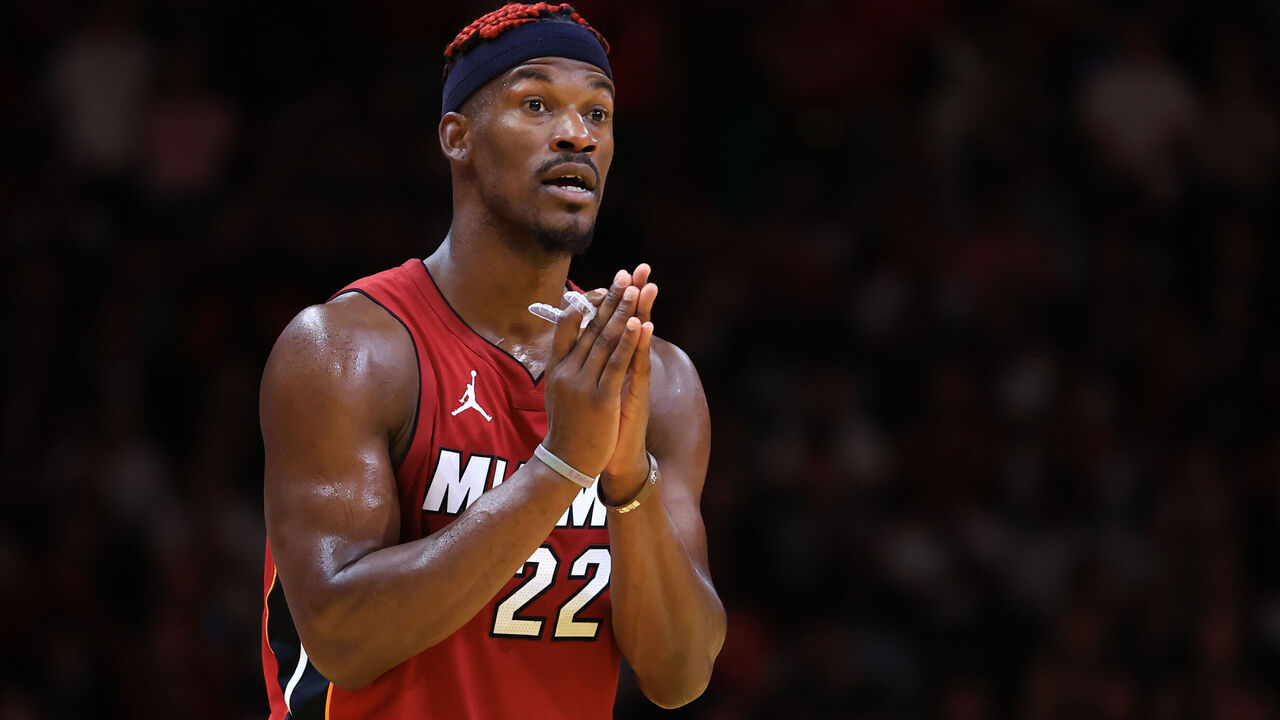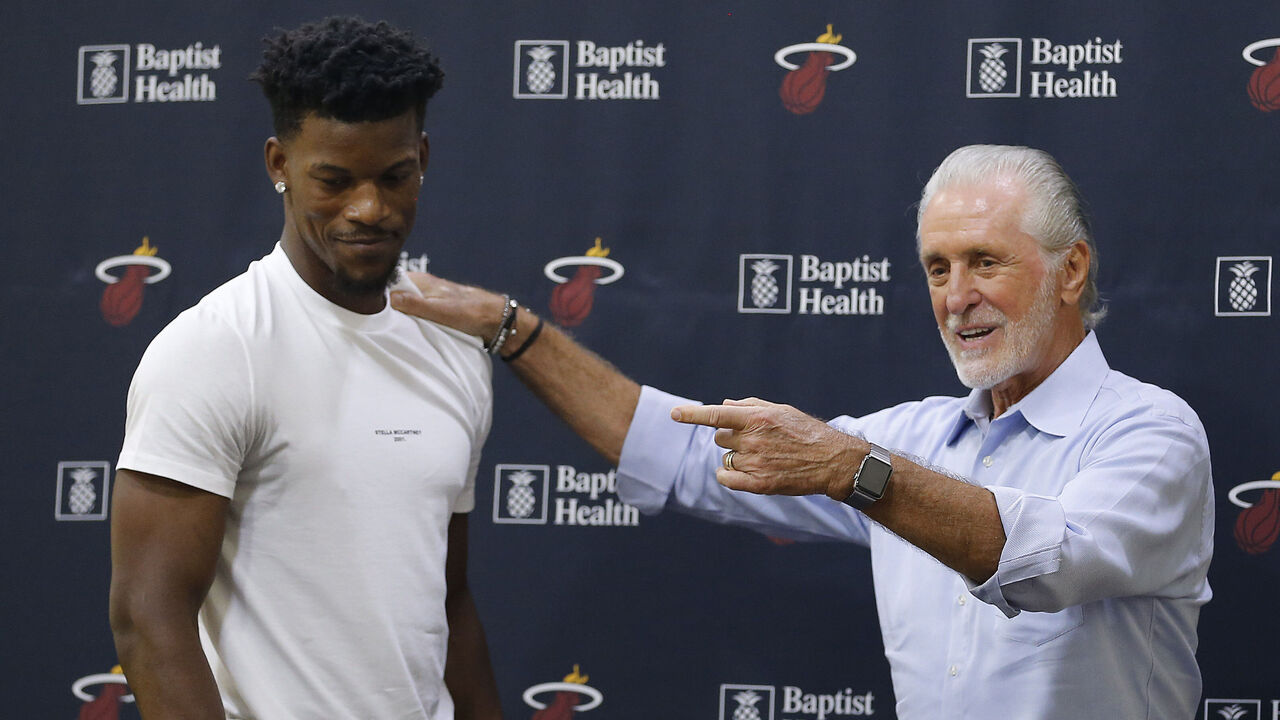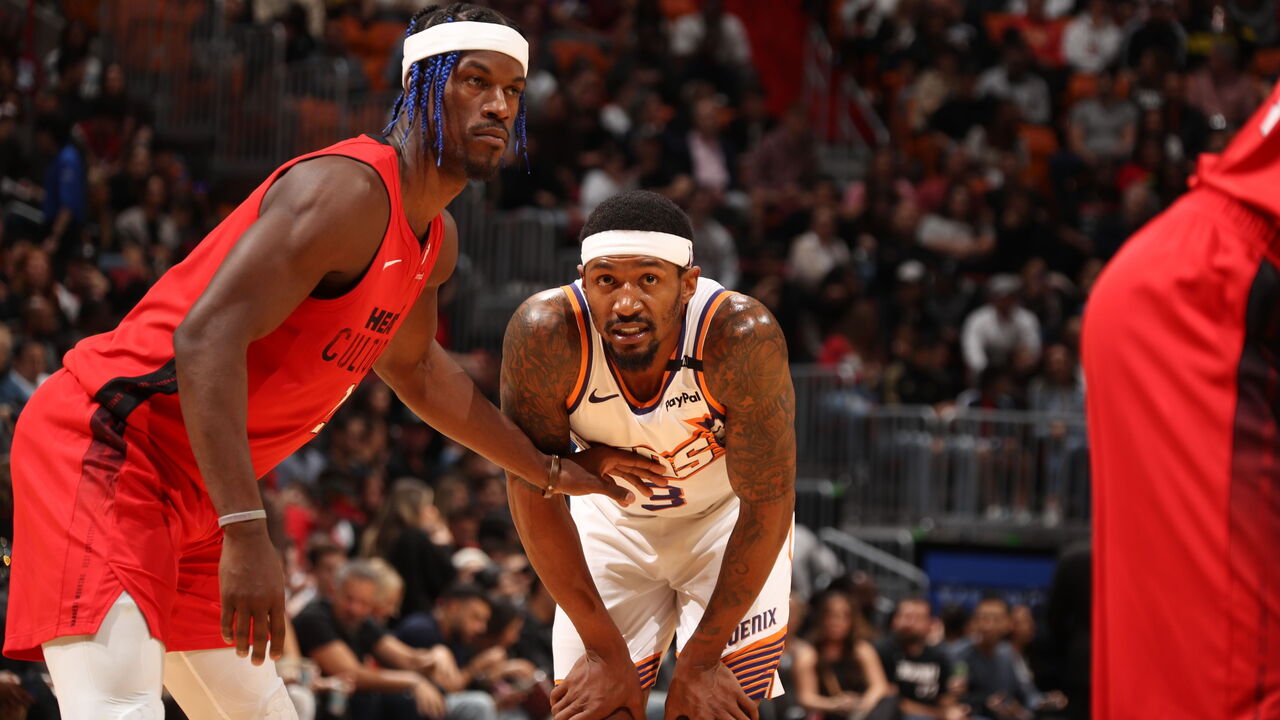Jimmy Butler and the Miami Heat were a match made in heaven. But the same factors that made that so meant there was always an expiration date on this seemingly perfect marriage. A public standoff was the only way it could end.
Butler’s no stranger to drama or trade requests, but the six-time All-Star finds himself in uncharted territory. He has little leverage, and in Heat president Pat Riley, Butler might’ve finally met his match.
Under normal circumstances, a franchise-level star who can opt for free agency in six months would hold all the cards. However, the feud between Butler and Miami is far from ordinary.

Butler remains a two-way game-changer when fully engaged. Only a month ago, he poured in 35 points, 19 rebounds, 10 assists, four steals, and a block in 44 minutes against Detroit. And we know he possesses postseason superpowers (only three-time MVP Nikola Jokic has accumulated more playoff win shares over the last five years). But he’s also a 35-year-old who hasn’t played 65 games in a season since 2018-19 and a secondary star at this stage of his career who seems unhappy in a diminished offensive role. And he’s burned bridges at every stop of his Hall of Fame-worthy career. (Though Chicago, Minnesota, and Philadelphia all deserve their share of the blame for those breakups).
Butler’s supporters point to Paul George’s four-year, $212-million contract as evidence there will still be a robust market for Butler’s services, but it’s not that simple. For one, George’s injury-riddled, inconsistent first season in Philadelphia is now a cautionary tale. In addition, while Butler’s the more dependable player come springtime, George was two years younger as a 2024 free agent than Butler would be as a 2025 free agent, and George entered free agency as an elite shooter. Long-range marksmanship can help players age gracefully and make them more universal fits around the league. Butler’s a career 33% 3-point shooter who’s attempted just 32 shots from deep in 22 appearances this season.
Then there’s the contractual minutiae. Butler, who turns 36 in September, wouldn’t be able to sign a contract as lucrative as the one George signed last summer because of the NBA’s over-38 rule. The biggest extension Miami could give him would be worth $112.6 million over two years, while the biggest extension a new team could offer would be worth roughly $111 million. In both cases, his 2025-26 salary would come in around $54.1 million. If he hits the open market, the longest contract he could sign would be for three years.
Factor in the new CBA’s more punitive tax rules and apron restrictions – and the fact only the rebuilding Nets have mountains of cap space this summer – and one report had league executives projecting Butler to earn $30-$35 million per year.
Given that the 2025-26 player option on Butler’s current deal is worth $52.1 million, you can understand why Riley and the Heat are willing to play hardball and call Butler’s bluff. If the biggest threat Butler poses to Miami is simply opting in to the final year of his contract, the franchise can live with that rather than settle for a bad trade now. And if Butler remains committed to opting out, he’ll have to take a pay cut while the Heat reap the benefits of clarity and flexibility.

This wouldn’t be akin to a team watching a younger star walk in his prime. Miami already got six years, two Finals trips, and plenty of value out of Butler. If he’s aging out or has worn out his welcome, it wouldn’t be devastating to let him walk. In an apron world, nothing can be better than something.
If the best offers for Butler include mediocre draft capital and bad contracts (like Bradley Beal’s), the Heat won’t budge. They can always operate under the assumption that if they just keep their books clean, they’ll lure another star sooner rather than later. Such is the advantage of South Beach and no state income tax.
It’s part of the reason Riley has moved on from legends before, like when the Heat let franchise icon Dwyane Wade leave via free agency over a dispute about Wade’s worth heading into the back half of his 30s. That’s not to say Riley hasn’t made mistakes, or even that he’s the executive he once was, but he’s not going to back down and allow Butler to hold Miami hostage or take a flamethrower to the locker room the way Butler did to previous teams. Heat Culture may not be all it’s cracked up to be, but Riley’s franchise is impervious to Butler’s shenanigans in ways Chicago, Minnesota, and Philly were not.
Finally, surveying the trade market inspires little confidence Butler will get his wish this time.

Phoenix would need to find a team willing to take on Beal’s remaining $110.8 million and his no-trade clause, and that’s if the Suns can even convince Beal to waive said clause. Meanwhile, the Warriors look so pedestrian this season that even Steph Curry seems to be advising Golden State’s front office not to do anything rash.
The Mavericks would need to gut the snug-fitting depth that helped turn them into a Finals team last season. The Nuggets have Michael Porter Jr.’s contract to use for salary-matching purposes and Butler’s off-ball work would pair beautifully with Nikola Jokic’s playmaking skills, but Denver already owns the league’s worst 3-point attempt rate. Replacing Porter with Butler would see the Nuggets double down on what’s already a tricky math problem. Is Butler the right fit for Houston now that his hometown Rockets sit second in the West with one of the league’s youngest rosters? Would replacing Dillon Brooks and other Rockets players with this version of Butler really take a team that can’t shoot over the top?
The Grizzlies and Bucks loom as potential sleepers. Would Memphis be willing to sacrifice depth and draft equity for an aging star it might only have for one playoff run? As for Milwaukee, the Bucks are a second-apron team that would have to get creative in trading Khris Middleton (among others) and finding a third team to help them duck said apron. It’s not impossible, but it certainly seems unlikely. You could probably say the same about any kind of Butler trade materializing at this point.
Butler is one of the NBA’s most fascinating figures – a relentless and rebellious winner turned coffee magnate – and the future Hall of Famer can still swing the title race, making his standoff with Miami the league’s must-watch story ahead of February’s trade deadline. Unfortunately, circumstances seem to dictate this gripping drama will come to an anticlimactic end.






